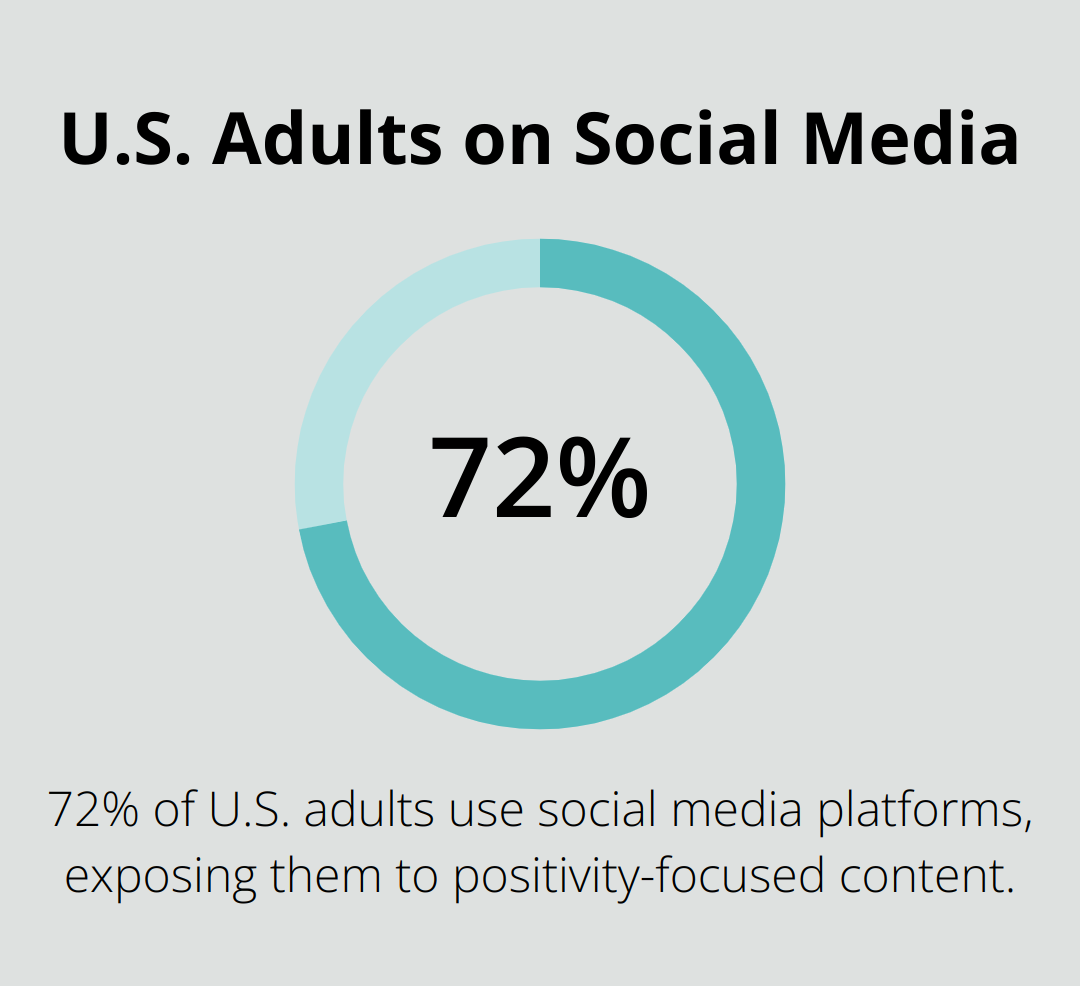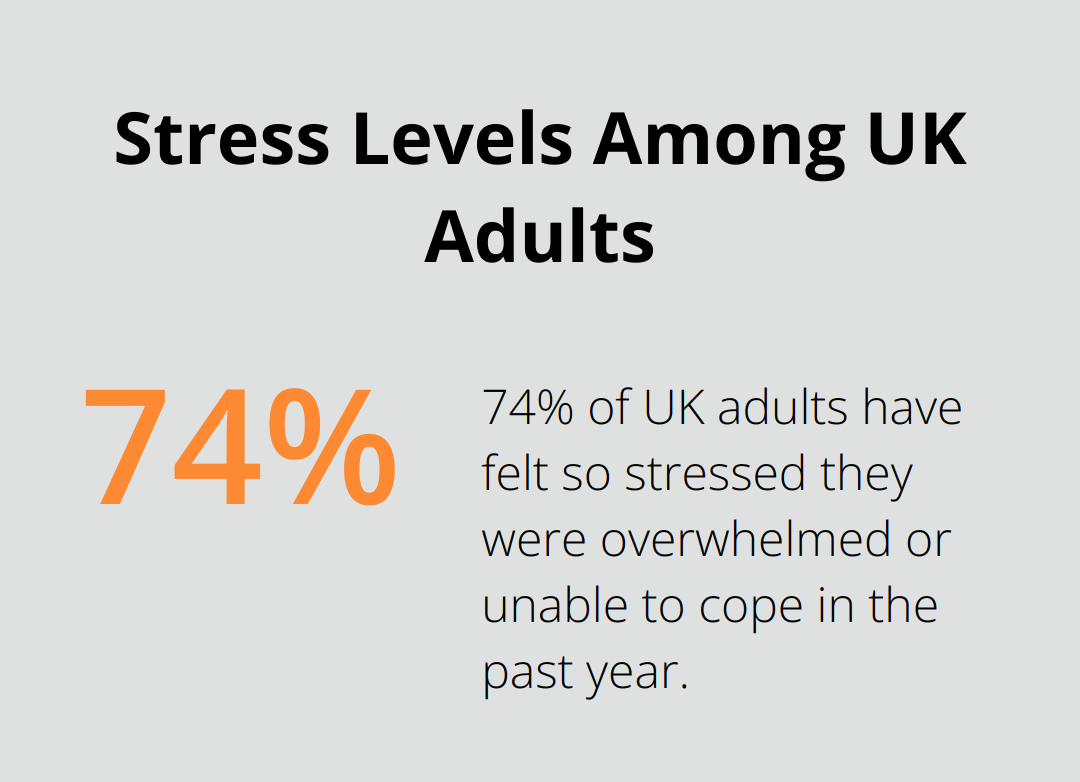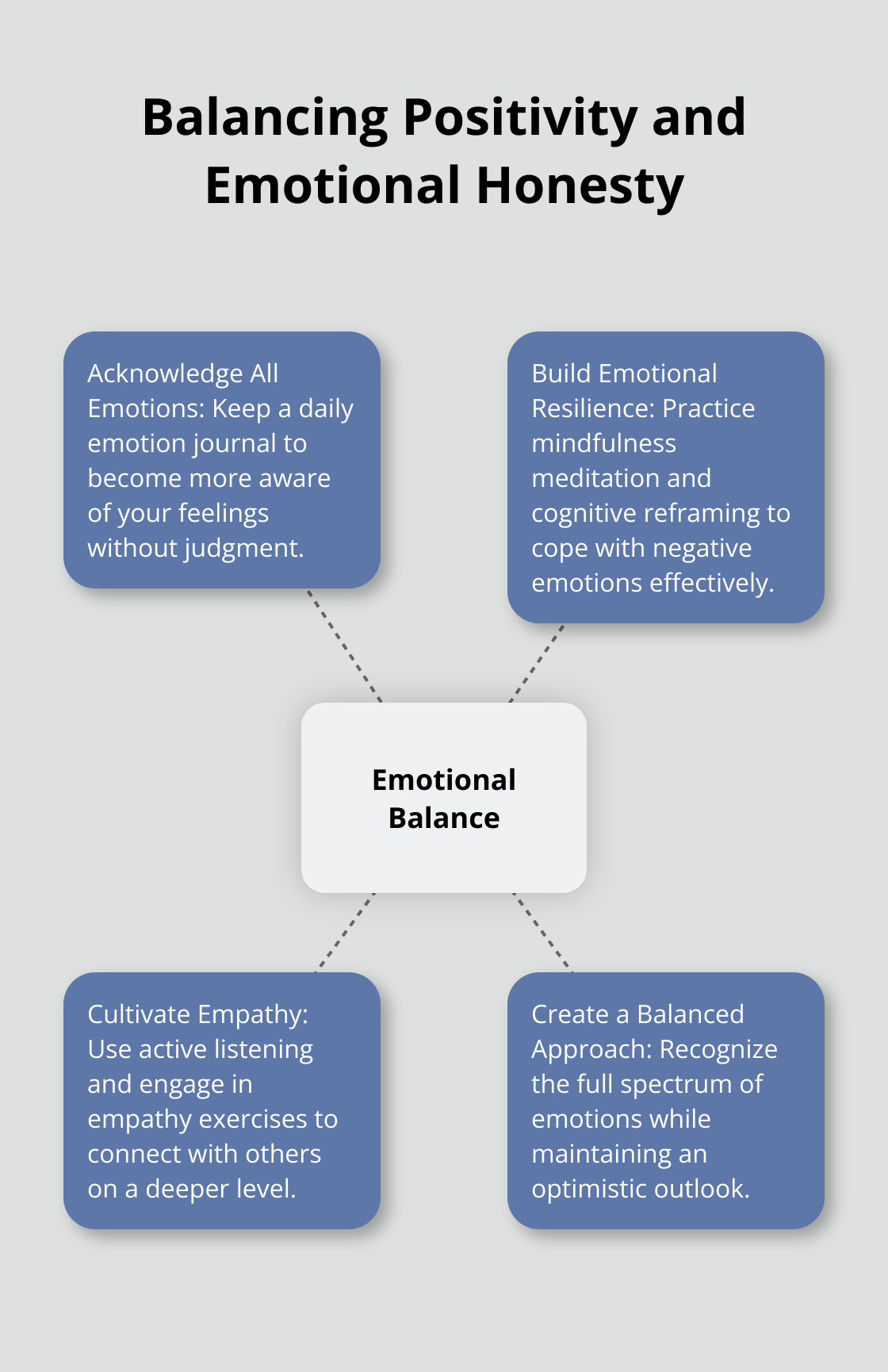At Global Positive News Network, we’ve noticed the rise of the “positive vibes only” meme across social media platforms. This popular phrase has become a mantra for many seeking to maintain a cheerful outlook on life.
However, is this mindset always beneficial? We’ll explore the potential drawbacks of enforcing constant positivity and discuss how to strike a balance between optimism and emotional honesty.
What Is the “Positive Vibes Only” Mindset?
The Origin of a Cultural Phenomenon
The “positive vibes only” mindset has become a cultural phenomenon, particularly on social media platforms. This phrase, often accompanied by sunny emojis and inspirational quotes, encourages people to focus solely on positive thoughts and emotions while avoiding anything negative.
The concept gained traction in the early 2010s, coinciding with the explosion of social media use. Platforms like Instagram and Pinterest transformed into hotbeds for motivational content, with users sharing colorful graphics and uplifting messages. A 2022 study by the Pew Research Center revealed that 72% of U.S. adults use social media, exposing a vast audience to this positivity-focused content.

The Appeal of Constant Positivity
Many people find the “positive vibes only” mindset attractive because it promises a life free from negativity. Proponents argue that focusing on the bright side can lead to improved mental health, increased productivity, and better relationships. A 2017 study published in the Journal of Positive Psychology found that individuals who practiced gratitude reported higher levels of well-being.
The Hidden Dangers of Forced Positivity
However, this relentless pursuit of positivity can have unintended consequences. Dr. Susan David, a psychologist at Harvard Medical School, warns that suppressing negative emotions can lead to increased stress and anxiety. In her book “Emotional Agility,” she argues that acknowledging and processing all emotions (both positive and negative) is essential for mental health.
Striking a Balance
While sharing uplifting stories and fostering optimism is valuable, it’s equally important to recognize the significance of emotional authenticity. Rather than promoting a “positive vibes only” mentality, we should encourage a full range of emotions while seeking out inspiring news and stories that can help maintain a hopeful outlook.
The Role of Social Media
Social media platforms (such as Facebook, Twitter, and Instagram) play a significant role in perpetuating the “positive vibes only” culture. Users often curate their feeds to showcase only the best moments of their lives, creating an unrealistic expectation of constant happiness. This selective sharing can lead to feelings of inadequacy and FOMO (fear of missing out) among followers.
As we explore the potential drawbacks of enforcing constant positivity, it becomes clear that a more nuanced approach to emotional well-being is necessary. The next section will examine the downsides of toxic positivity and its impact on mental health.
The Dark Side of Forced Positivity
The Emotional Toll of Suppressing Feelings
The “positive vibes only” mindset, while well-intentioned, can lead to harmful consequences when taken to extremes. This approach, often referred to as toxic positivity, can have serious impacts on mental health and relationships.
Research shows that emotional suppression can lead to increased stress, anxiety, and even physical health problems such as high blood pressure. Constantly pushing away negative emotions doesn’t make them disappear. Instead, it can lead to emotional buildup and eventual outbursts.
Dr. Jaime Zuckerman, a clinical psychologist, explains that denying our negative emotions can actually intensify them. She recommends acknowledging and processing all emotions (both positive and negative) as a healthier approach to emotional well-being.
When Positivity Becomes Invalidating
Toxic positivity can be particularly damaging in relationships. Responses to someone’s struggles with phrases like “just think positive” or “it could be worse” can make them feel unheard and invalidated. This dismissive attitude can lead to feelings of isolation and reluctance to share genuine emotions in the future.
A survey conducted by the Mental Health Foundation found that 74% of UK adults have felt so stressed at some point over the last year they felt overwhelmed or unable to cope. In such situations, toxic positivity can exacerbate feelings of inadequacy and failure.

The Anxiety Paradox of Forced Happiness
Ironically, the pressure to maintain constant positivity can itself become a source of anxiety and stress. The American Psychological Association reports that attempts to suppress or avoid thoughts can actually make them more frequent and intense.
Dr. Susan David, in her TED Talk (viewed over 9 million times), emphasizes that emotional agility – the ability to face our inner experiences with curiosity and kindness – is far more beneficial than forced positivity.
Striking a Balance
While sharing uplifting stories is valuable, it’s equally important to recognize the significance of emotional authenticity. We should encourage a full range of emotions while seeking out inspiring news and stories that can help maintain a hopeful outlook.
The next chapter will explore practical strategies for balancing positivity with emotional honesty, allowing for a more nuanced and healthy approach to well-being.
How to Balance Positivity and Emotional Honesty
Acknowledge All Emotions
At Global Positive News Network, we recognize the importance of emotional honesty alongside positivity. The first step to achieve emotional balance is to acknowledge that all emotions serve a purpose. Dr. Brené Brown, a research professor, has conducted grounded theory research on courage, vulnerability, and shame. Her work suggests that embracing vulnerability and authenticity can lead to improved emotional well-being.
To practice emotional honesty, you can keep a daily emotion journal. Spend five minutes each day to write down your feelings without judgment. This simple exercise will help you become more aware of your emotional patterns and accept your feelings as they come.
Build Emotional Resilience
Emotional resilience is the ability to adapt to stressful situations and recover from adversity. It doesn’t mean avoiding negative emotions, but rather developing skills to cope with them effectively.
One practical way to build resilience is through mindfulness meditation. A study examined the association between practice dosage and several constructs related to psychological functioning. Apps like Headspace or Calm (popular choices for guided meditations) offer sessions specifically designed for emotional resilience.
Another effective technique is cognitive reframing. This involves challenging negative thought patterns and looking for alternative perspectives. For example, instead of thinking “I’m a failure because I made a mistake,” try reframing it as “I’m human and mistakes are part of the learning process.”
Cultivate Empathy and Active Listening
Empathy and active listening are essential skills for maintaining emotional balance in our relationships. These skills allow us to connect with others on a deeper level and provide genuine support during difficult times.
To practice active listening, focus entirely on the speaker without interrupting or planning your response. Use non-verbal cues like nodding and maintaining eye contact to show you’re engaged. After they’ve finished speaking, paraphrase what you’ve heard to ensure understanding.
For developing empathy, try the 20-minute empathy exercise developed by psychologist Arthur Ciaramicoli. Spend 20 minutes each day to imagine yourself in someone else’s shoes, considering their thoughts, feelings, and experiences. This practice will help you become more attuned to others’ emotions and respond with greater compassion.
Create a Balanced Approach
These strategies will help you create a more balanced approach to positivity – one that acknowledges the full spectrum of human emotions while still maintaining an optimistic outlook. True positivity isn’t about ignoring negative feelings, but about facing them with courage and compassion.

At Global Positive News Network, we strive to provide uplifting news that inspires peace and positivity (while also recognizing the complexity of human emotions). Our platform offers stories of personal triumphs, acts of kindness, and community impact, all curated to help you maintain an optimistic perspective without dismissing the challenges of life.
Final Thoughts
The “positive vibes only” meme has gained popularity on social media, highlighting the importance of optimism. However, we recognize that true emotional well-being requires a more nuanced approach. Constant positivity can lead to suppression of genuine emotions and invalidation of others’ experiences, potentially increasing anxiety and stress levels.
We advocate for a balance between positivity and emotional honesty. This balanced perspective allows us to face life’s challenges with courage and compassion while maintaining an optimistic outlook. Developing emotional resilience, practicing empathy, and engaging in active listening contribute to a healthier approach to well-being.
At Global Positive News Network, we provide uplifting news that inspires peace and positivity without dismissing the complexities of human emotions. Our curated stories of personal triumphs, acts of kindness, and community impact (which aim to foster hope and optimism) acknowledge the full spectrum of human experiences. We invite you to explore our platform and embrace a more authentic approach to positivity.


